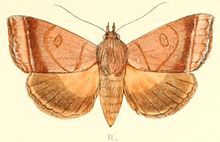Ophiusa trapezium is a moth of the family Erebidae first described by Achille Guenée in 1852. It is found from the Indo-Australian tropics of India, Sri Lanka to Queensland, the Bismarck Islands and New Caledonia. Adults are fruit piercers.[1]
| Ophiusa trapezium | |
|---|---|

| |
| Scientific classification | |
| Domain: | Eukaryota |
| Kingdom: | Animalia |
| Phylum: | Arthropoda |
| Class: | Insecta |
| Order: | Lepidoptera |
| Superfamily: | Noctuoidea |
| Family: | Erebidae |
| Genus: | Ophiusa |
| Species: | O. trapezium
|
| Binomial name | |
| Ophiusa trapezium (Guenée, 1852)
| |
| Synonyms | |
| |
Description
editIt has a wingspan of 66 mm. The head and thorax are bright rufous. Shaft of antennae whitish. Abdomen brownish fuscous. Forewings bright rufous suffused with purplish as far as the postmedial line and beyond the submarginal line. There is an outwardly oblique antemedial line jointed at inner margin by the obliquely waved postmedial line. The reniform with rufous outline. A double sub-marginal straight line and marginal dentate line. Hindwings brownish ochreous. The inner area clothed with fuscous hair. A broad diffused sub-marginal fuscous band present. Ventral side brownish ochreous. Forewings with fuscous cell and a submarginal patch.[2]
Larvae have been reared on Melaleuca species (Myrtaceae) and Melastoma malabathricum (Melastomataceae).[3]
Gallery
edit-
Female, dorsal view
-
Female, ventral view
-
Male, dorsal view
-
Male, ventral view
References
edit- ^ Holloway, Jeremy Daniel. "Ophiusa trapezium Guenée". The Moths of Borneo. Retrieved 13 August 2016.
- ^ Hampson, G. F. (1894). The Fauna of British India, Including Ceylon and Burma: Moths Volume II. Taylor and Francis – via Biodiversity Heritage Library.
- ^ "Leong, T. M., 2009. Late instar larva and metamorphosis of Ophiusa trapezium (Guenée) in Singapore (Lepidoptera: Noctuidae: Catocalinae). Nature in Singapore, 2: 203–207" (PDF). Archived from the original (PDF) on 2015-01-03. Retrieved 2015-01-03.
- "Fruit-piercing moth Ophiusa trapezium (Guenée) (Lepidoptera: Noctuidae: Catocalinae)". Pest and Diseases Image Library. Archived from the original 20 August 2008.